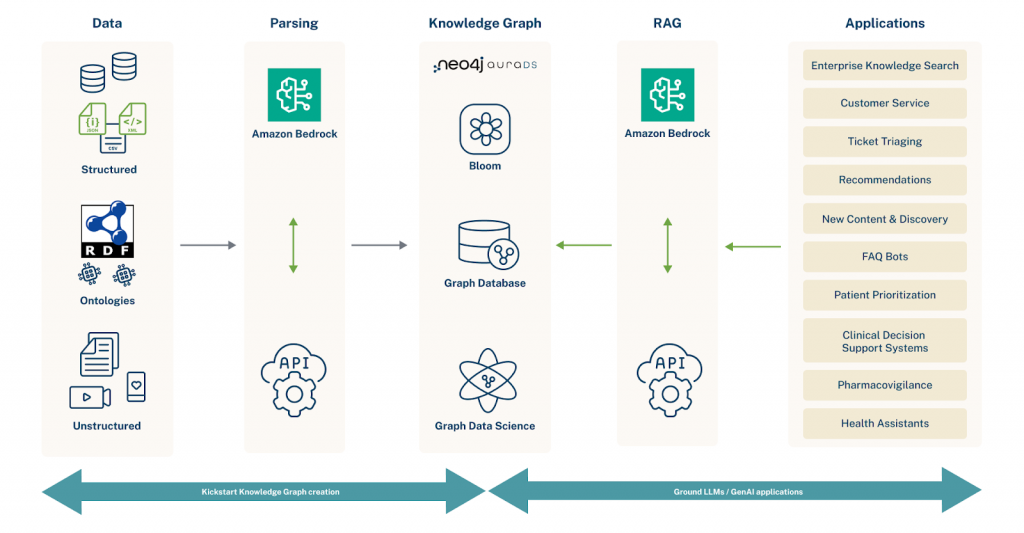Multi-year Strategic Collaboration Agreement includes integration with Amazon Bedrock for enterprise generative AI outcomes that are more accurate, transparent, and explainable
Neo4j announced a multi-year Strategic Collaboration Agreement (SCA) with Amazon Web Services (AWS) that enables enterprises to achieve better generative artificial intelligence (AI) outcomes through a unique combination of knowledge graphs and native vector search that reduces generative AI hallucinations while making results more accurate, transparent, and explainable. This helps solve a common problem for developers who need long-term memory for large language models (LLMs) that are grounded in their specific enterprise data and domains.
Neo4j also announced the general availability of Neo4j Aura Professional, the company’s fully managed graph database offering, in AWS Marketplace, enabling a frictionless fast-start experience for developers on generative AI. AWS Marketplace is a digital catalogue with thousands of software listings from independent software vendors that make it easy to find, test, buy, and deploy software that runs on AWS.
“The integration of Neo4j’s graph database and AWS’ cloud computing technology offers a powerful solution to ASEAN enterprises. With generative AI gaining more traction among organisations, our partnership enables them to harness data with greater speed, transparency and accuracy – ultimately leading to better insights, improved customer experiences, and better business outcomes.”
Nik Vora, Vice President, Asia Pacific, Neo4j
Neo4j is a leading graph database with native vector search that captures both explicit and implicit relationships and patterns. Neo4j is also used to create knowledge graphs, enabling AI systems to reason, infer, and retrieve relevant information effectively. These capabilities enable Neo4j to serve as an enterprise database for grounding LLMs while serving as long-term memory for more accurate, explainable, and transparent outcomes for LLMs and other generative AI systems.

With today’s announcement, Neo4j is releasing a new integration with Amazon Bedrock, a fully managed service that makes foundation models from leading AI companies accessible via an API to build and scale generative AI applications. Neo4j’s native integration with Amazon Bedrock enables the following benefits:
- Reduced Hallucinations: Neo4j with Langchain and Amazon Bedrock can now work together using Retrieval Augmented Generation (RAG) to create virtual assistants grounded in enterprise knowledge. This helps customers by reducing hallucinations and providing more accurate, transparent, and explainable results.
- Personalised experiences: Neo4j’s context-rich knowledge graphs integration with Amazon Bedrock can invoke a rich ecosystem of foundation models that generate highly personalised text generation and summarisation for end users.
- Get complete answers during real-time search: Developers can leverage Amazon Bedrock to generate vector embeddings from unstructured data (text, images, and video) and enrich knowledge graphs using Neo4j’s new vector search and store capability. For example, users can search a retail catalogue for products explicitly based on ID or category, or implicitly search based on product descriptions or images.
- Kickstart a knowledge graph creation: Developers can leverage new generative AI capabilities using Amazon Bedrock to process unstructured data so it becomes structured and load it into a knowledge graph. Once in a knowledge graph, users can extract insights and make real-time decisions based on this knowledge.
Pablo Lima, CEO, TAG Infraestrutura do Mercado Financeiro, said, “The combination of knowledge graphs by Neo4j and generative AI capabilities by Amazon Bedrock will allow us to build generative AI applications at scale and democratise credit analysis and insights for our market. We have all types of data from transactions that include merchants, creditors, location, processing devices, transactions nature, amounts, values, and others – and Neo4j is the perfect database to store these highly connected transactions more efficiently and adjust them to new rules more responsively. Neo4j’s analytical tools and algorithms also help us create new products that provide insights to our partners on how to tailor their products and services better to the merchants and creditors.”
Harrison Chase, CEO, LangChain, added, “LangChain with Neo4j and Amazon Bedrock can now work together using Retrieval Augmented Generation (RAG) to create virtual assistants that are grounded in enterprise knowledge, removing hallucinations and providing more accurate, transparent, and explainable results. It’s a great step forward in helping teams close the gap between the magical user experience that generative AI enables and the work it requires to actually get there.”
Atul Deo, General Manager, Amazon Bedrock, AWS, maintained, “At AWS, we remain committed to empowering organisations with a diversity of tools and resources to build generative AI solutions that align with their unique customer experiences, applications, and business requirements. With Neo4j’s graph database and Amazon Bedrock’s integration, we aim to provide customers sophisticated options to deliver more accurate, transparent, and personalised experiences for their end-users in a fully managed manner.”
Sudhir Hasbe, Chief Product Officer, Neo4j, said, “Neo4j has been an AWS Partner since 2013 – with this latest collaboration representing an essential union of graph technology and cloud computing excellence in a new era of AI. Together, we empower enterprises seeking to leverage generative AI to better innovate, provide the best outcome for their customers, and unlock the true power of their connected data at unprecedented speed.”




